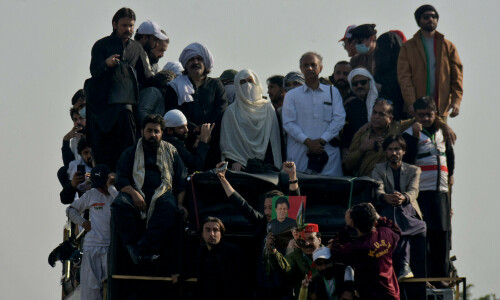ISLAMABAD, June 7: An angry National Assembly speaker barred journalists from parliament on Thursday in a show of insensitivity to their protests against new media curbs and what critics called the regime’s desperation in the face of a democratic movement spurred by the prevailing judicial crisis.
It was another first in Pakistan’s parliamentary history as Speaker Chaudhry Amir Hussain was quoted to have ordered his staff not to let journalists enter the parliament building to cover Thursday’s sitting of the National Assembly in what seemed to be a reprisal for a previous day’s unprecedented incident when they chanting slogans from the press gallery had scuffles with non-journalists who allegedly tried to undermine their protest walkout by occupying reporters’ seats.
Only members of the state media — the Pakistan Television, Radio Pakistan and the Associated Press of Pakistan -- were allowed entry to cover the second day’s proceedings of the present lower house’s last budget session in its fifth year whose opening day on Wednesday was marked by protests by journalists and the opposition against a newly-promulgated Pakistan Electronic Media Regulatory Authority (Pemra) (Amendment) Ordinance providing for easier and harder punishments for perceived violations of the original Pemra law.
All journalists from newspapers, private television channels and other domestic and foreign news organisations were not allowed entry when they arrived at the parliament building for the scheduled 10am start of the National Assembly sitting. But they stayed on outside under a scorching sun, often chanting slogans such as “we want freedom” and “Pemra Ordinance na-manzoor (unacceptable)” whenever a government minister or other assembly members would come and drive into the parliament premises.
ZIA’S RUTHLESSNESS RECALLED: There was an angry exchange of remarks between Religious Affairs Minister Mohammad Ejaz-ul-Haq and some protesters who recalled the ruthlessness of his father Gen Mohammad Ziaul Haq’s military regime that even ordered flogging of some of the non-conformist journalists.
Never before journalists were barred en masse from parliament in nearly 60 years of Pakistan’s life -- even under long military ruler periods of Field Marshal Ayub Khan (1958-69) and General Zia (1977-88) while the National Assembly elected under General Yahya Khan (1969-71) could not meet before the end of his regime with the fall of former East Pakistan.
“The press gallery is closed today,” a National Assembly press official told Dawn when asked for reasons of journalists being stopped by the security staff from entering the building.
The security staff had lists of names of state media staff who only could be allowed in.
Several opposition members came to voice support for the protesting journalists before driving into the building and during an opposition protest walkout that they said also broke quorum forcing a rare suspension of proceedings during the question hour of the house, which was later adjourned until 10am on Friday, when the journalists are likely to be issued fresh entry passes in revised list.
PPP secretary-general Raja Pervez Ashraf, while assuring his party’s support for the journalists’ cause, quoted Law and Justice Minister Mohammad Wasi Zafar as saying inside the house that “those protesting at the (building) gate are not journalists but ghundas (hooligans)” -- remarks that were greeted with cries of “shame, shame” from the protesters.
Some other opposition members, including PML-N’s Tehmina Daultana and MMA’s Farid Ahmad Piracha, confirmed that the law minister used these remarks as they voiced solidarity with the protesters and condemned what they called as desperate behaviour of the regime.
HRCP SUPPORT: Human Rights Commission of Pakistan (HRCP) secretary-general Iqbal Haider, who came to reassure HRCP’s support to the journalists’ cause, described the new ordinance as “barbaric, illegal and immoral” and called the bar on parliamentary reporters “the worst attack on the freedom of press”.
He said the house speaker’s orders negated the people’s right to know and the assembly members’ right to let their constituencies know what they were doing in the house.
Mr Haider, a former law minister, compared the present rulers’ position to the proverbial “bull in the china shop” out to destroy every institution to retain power.













































Dear visitor, the comments section is undergoing an overhaul and will return soon.